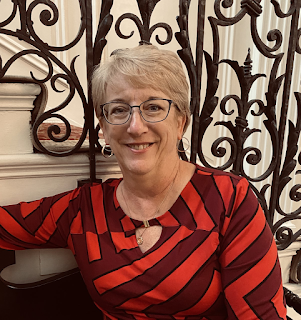A small fishing village, a shunned healer, her
daughter, tradition, superstition, and a world set to change.
Kerensa lives with her mother, the healer
Meliora, on the edge of a small fishing community on the Cornish Coast.
The townsfolk, who work the fish runs of
pilchard and mackerel that make their way up the Atlantic coast, call on her
mother for help with their ailments, but never for her company.
Kerensa does not know why.
Curses and superstitions whisper around her as she
grows into a competent young woman, fighting for her place amongst the people
of Porth Gwynn.
But what has caused the rift between her and
the town?
And can their traditional way of life survive
in the face of changing winds?
Where the Gulls Fall Silent is an historical
fiction that explores the lives of the fishermen and women who made their
living from the rough Atlantic Ocean; the hardship they faced; the secrets that
divided them; and the community spirit that pulled them through.
A story of love, loss, hope, and second chances.
Trigger Warnings:
Adult themes, mentioned sexual assault
Follow the tour HERE
Buy Links:
Available on #KindleUnlimited
Amazon UK Amazon US Amazon CA Amazon AU
¸.•*´¨)✯ ¸.•*¨) ✮ ( ¸.•´✶
EXCERPT
Mackerel Pasties
Porth Gwynn, Cornish
Coast 1852
The high noon sun beat
down on the port, a gentle breeze swirled about the rippling currents of the
bay, and the children ran.
The white sand of low tide
puffed beneath their feet, their squeals of laughter pealing out across the
water. Two mothers, skirts hitched to their thighs, arms wet with the sea
they’d walked out to meet, looked up from their nets, sun-browned hands
shielding their eyes to watch the children pass, then, heads shaking, bent back
to their task. The men did not look up from the slimy silver flash of pilchard
bodies that squirmed within their catch.
Back on the shore, the
children closed in. The leader, Rewan Lobb, a boy of about ten summers, dark of
hair and eye, whirled a kerchief above his head in defiance and grinned, before
leaning to his task and putting on speed. He loved to tease the little ones.
Near the back of the pack Kerensa Williams, small and fair, loped, her uneven
gait hindering her pace, but not her determination. Gerens, a smaller, lighter
version of the boy with the kerchief, kept pace beside her, uninterested in
defeating his older brother and claiming the kerchief, just happy to be part of
the group. Suddenly, Derwa lunged, hand brushing along Rewan’s untucked shirt,
almost catching him. Rewan spun, running backward for a few steps, taunting.
Then, without warning, he spun round, feinted left then darted right up the
naturally rocky outcrop that lined the bay. Long legs cleared the rocks
quickly, landing on the pebbled streets of Porth Gwynn. On the top he paused,
jogging on the spot, watching his pursuers as their shorter legs navigated the
rocky climb. Derwa cleared the gap first, Rewan let out a laugh of delight and
shot ahead towards the cluster of stone cottages that hugged the bay’s edge.
Just coming to the rocks Kerensa looked up, a heavy frown on her face. She
watched Rewan gliding fast along the foreshore, his eyes checking over his
shoulder periodically, focused only on those upon his heels. The rocks would
slow her, the pebbles too. Sand was more forgiving to her uneven gait.
Kerensa
decided.
She shot left, running as
fast as her mismatched legs allowed, skirting the line of the rock barrier.
Confused, Gerens paused, one foot already placed to climb. He watched. The
shoreline before him curved in. He saw Rewan moving along the curve, saw
Kerensa matching his direction, but from the inside of the curve. He
understood. Slowly Kerensa came up closer to Rewan, then in line, then,
amazingly started to slowly pull in front. Rewan did not look down to the
beach, his eyes saw only Derwa, closely followed by Cardor and Treeve. Letting
loose a whoop of delight, Gerens set off along the beach, following Kerensa’s
path.
Kerensa’s
breathing was ragged and her right foot ached abominably, but she would not
stop. Ahead of Rewan now, the end of the bay was approaching, changing suddenly
from flat sand to rocky cliff face. Rewan would veer inland, circling through
the cottages and huts, back towards the centre of town. She had to intercept
him before then. It was time to make her move. Taking a deep breath and bracing
herself for the pain, Kerensa bolted right, leaping onto the rocks, hands and
feet splayed to scramble up the incline. A sharp edge caught her hand, slicing
the tender skin of her outer palm. She didn’t notice, didn’t stop, eyes fixed
on the top of the climb, on the street, on her goal.
Scrabbling she cleared the
rocks, pulling herself up to standing. Rewan’s head was turned, watching the
other children, his loping stride bearing down on her fast. Kerensa braced
herself, feet planted firmly, hands out ready to snatch the kerchief.
She didn’t see Kenver,
running down from the fish sheds, but Gerens did. Eyes wide he tried to call
out a warning, but it was too late.
It all happened at once.
Rewan looked forward and saw Kerensa standing in his path, shock loosened his
mouth as he tried to slow his forward pace. Seeing his body twitch,
anticipating his next move, Kerensa lunged to the side, arms reaching, just as
Kenver hit the pebbled streets, the momentum of his downward run affording him
no opportunity to change direction and then – bam!
All three children came
together at once in a ball of limbs, bones, scrapes, and cries of shock.
The pebbled street came up
to meet Kerensa’s cheekbone. She rolled with the impact, the wind knocked from
her lungs, coming to a stop on her side, the weight of someone else’s legs
sprawled across her waist. The legs moved and Kerensa sat up. Kenver, whose
legs had landed on her, stood up, shaking with rage.
“What the hell Rewan?” he
shouted. “Look where you’re bloody going!”
Sat in the dirt of the
street Kerensa brushed down the front of her cotton dress, checking for tears,
her nimble fingers finding one just above her knee. She inspected it quickly,
it would need a patch. Something to do before mother comes home…
Kenver looked over at her,
“You all right there Kez?” he asked, offering her his hand to stand. Kerensa
ignored him, pulling herself to her feet, wobbling slightly. He looked away,
back to Rewan, laying on his side, face away from them. He hadn’t moved.
The rest of the children
arrived, circling around the trio, Gerens coming up the rocks behind Kerensa.
Silently he stood by her side, eyes quickly scanning to check she was all
right. A small graze on her cheek was slowly welling with blood. He knew better
than to say anything, though.
Still Rewan hadn’t moved.
“Rewan?” Kenver called again, voice wary now, his
initial fury replaced with a twinge of fear. Slowly the children stepped
forward, inching towards their leader. Rewan, the oldest of their group by at
least two summers, son of the town’s most successful fisherman, who would
inherit the fine boat known as the Silver Sea, whose last summer of childhood
was now waning… what if?
Kenver reached down,
gripping Rewan’s shoulder, “Rewan, say something,” he pleaded, then rolled his
friend’s body onto his back.
Rewan’s
face was split wide in a huge grin of amusement, his body shaking with mirth.
He was laughing, laughing uncontrollably. And he laughed, and laughed, and
laughed and laughed.
Lelita Baldock
Lelita Baldock is an
author of historical fiction and crime fiction.
She has a passion for
dark stories, with an unexpected twist.
It was during her
years studying English Literature at University that Lelita discovered her love
of all things reading and writing. But it would be another 15 years before she
would take up the challenge and write her own novel.
Her debut novel, the
historical fiction Widow's Lace, is an Amazon best-seller.
Her follow up, The
Unsound Sister, saw her take a different direction in her writing, trying her
hand at crime fiction, and has been warmly received globally.
Her third novel, Where
the Gulls Fall Silent, a traditional historical fiction set in mid-1800s
Cornwall, is out now.
Lelita also runs a
blog and newsletter featuring fellow authors and other creatives.
Social Media Links:
Website Twitter Facebook Instagram Amazon Author Page











.png)












